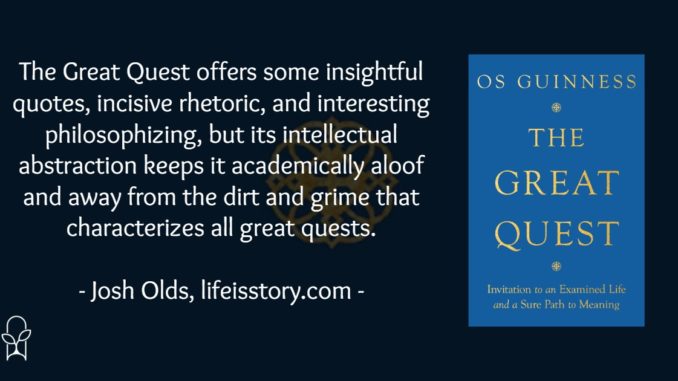
Published by IVP on March 22, 2022
Genres: Academic, Non-Fiction, Theology
Buy on Amazon
Goodreads

"The unexamined life is not worth living." ―Socrates What is life all about? What are we here for? Is there any meaning or purpose to our existence? Thinkers throughout the centuries have pondered these questions. While the distractions of the modern world prevent many from grappling seriously with such matters, the truth is that humans cannot live without meaning any more than we can live without breathing or eating. Os Guinness invites us to examine our lives and join the great quest for meaning and a life well lived. For those who are up to Socrates' challenge, it is a search that is indispensable to making the most of life. Guinness charts the course of the thinking person's journey toward faith and meaning, calling for a firm grasp of reason, an honest awareness of conscience, and a living sense of wonder. He affirms that there is a time for questions, and that following those questions can indeed lead us to answers, evidence, and commitment. When life becomes a question, the search is on for an answer. Come find yourself on a sure path to meaning.
Only Os Guinness could write a book on discovering meaning in life and fully and comprehensively cover the topic in 120 pages. The Great Quest is an invitation to living an examined life. Dr. Guinness plays off of Socrates’ famous words “The unexamined life is not worth living.”
The first third of the book sets up the journey toward an examined life. That is, a pretty good chunk of The Great Quest isn’t about the quest but in all the things that lead up to the quest to prepare us for the journey. That should tell you the value Guinness places on preparation. Only once you’d determined the path can you actually set out on your journey. In the opening chapters, Os philosophizes that life is a journey (we prefer the word “story” here at lifeisstory.com, but I’ll allow it) and that it’s only truly lived when we understand where we’re going and what we’re doing. Too many people, he says, simple float through life incurious, unquestioning, and distracted from the purpose of living. There is a sense in which he’s right, of course, but his perspective is one that’s built on a sort of elitism and classism that never acknowledges the vast number of people who are simply too exhausted by survival to do much more. There is little time to philosophize and dream when simply getting to the next meal or the next paycheck will be a struggle.
That sort of highbrow philosophizing sort of sets the tone for The Great Quest. If the audience is the educated and the financially-secure, then his words ring true and serve to either encourage or indict. But Guinness fails to address or consider with any substance the vast numbers of people whose search for meaning in life is halted by the need to survive. As such, his audience is limited and while he offers an indictment on the ruling class, he has no balm for the bourgeoise.
Guinness suggests that the answers to the meaning of life lie in three broad, conceptual families of worldviews—Eastern philosophy/religions, secularism, and Abrahamic religions. Unfortunately, the size of the book does not allow him to engage with that concept in much detail and, as he remains at the conceptual level, there is little practical discussion of how or why individuals choose or fall into any of these families. For The Great Quest, the answer lies in a subset of the Abrahamic faiths, namely Christianity. This is no surprise, of course. Guinness’s conclusion is that “loving and being loved [by God] is the very heart and soul of faith and the meaning of life.”
In the end, The Great Quest offers some insightful quotes, incisive rhetoric, and interesting philosophizing, but its intellectual abstraction keeps it academically aloof and away from the dirt and grime that characterizes all great quests. While The Great Quest patterns itself after the mold of Malcolm Muggeridge, it is no Jesus Rediscovered.
